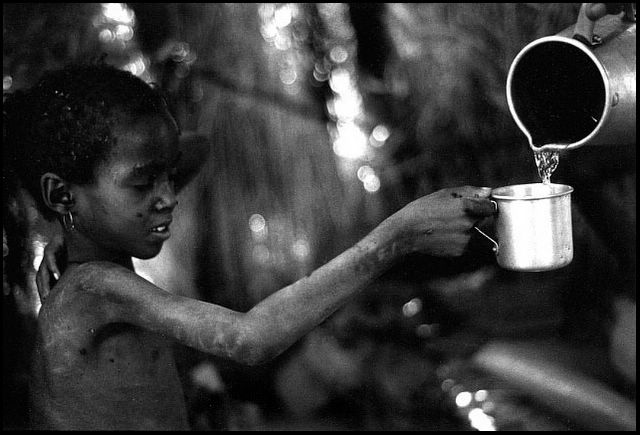Matthew 10:37-42 & Romans 6:12-23
Last week we talked of freedom – freedom for and freedom from. In his famous letter of pastoral advice to the ancient church in Rome, Paul focuses on this freedom that we know in Christ to be like Christ and from the enslavement of the world. Some simplify this in evangelicalese by saying that everything in the world is bad, evil, unrighteous, and so we should withdraw to remain pure, good and righteous. More liberal approaches view the conundrum of freedom from the polar opposite perspective, rather than flee the world we should be in the world, working for justice. Paul however traces an argument that is neither evanelical nor liberal, both in the world and not of the world.
Our section today from Matthew 10 is the conlcusion to the coaching tips that jesus gives to his disicples before he sends them out two by two before him to prepare the way, by proclaiming his message. His coaching is one of empowerment: Jesus has been given divine authority of the Earth, and Jesus democratizes that authority extending it to all who follow him, and are sent out in his name. God’s power is at work in the world not only in and through Jesus, but also in and through the disciples – and by extension in and through us today! The first half of our selection depicts Jesus’ rather peculiar system of family values. Family is not defined by blood, DNA, clan and language…but rather by obendience, discipleship, both faith identity and participation. Jesus talks of prophets, little ones and righteous ones in the text: but who are they? In Matthew’s gospel, the disciples themselves embody all three identities. Matthew emphasizes that disciples serving as Jesus’ agents are his righteous ones and prophets, even greater than the prophets of old (Mt 5:11-12; 11:9; 13:17). For him, disciples were also little ones (10:42), the easily oppressed and powerless who depended solely on God (18:3-6, 10). The disciples are prophets (10:41a); they are the righteous (10:41b) who “let their light shine before men (5:16) as they minister to the towns and villages of Israel (10:11-14). [Albright and Mann, Anchor Bible Commentary on Matthew]
In Romans 6, Paul is reminding us that even in our freedom we are subject to other forces. We are sinners, but as we talked of last week we are delivered from SIN and yet still struggle with the empire of sin in our daily lives. We’re free, but Paul is saying that we are never, not under an obligation to follow something: God, culture, other people, our desires, ourselves…. We both overestimate the power of our freedom, and sells ourselves short – limiting of minimizing our freedom in Christ, underestimating the importance of our actions, our collaborative solidarity with what God is doing in the world. Faith and discipleship doesn’t have to be heroic. In our relationships isn’t it oftentimes the small gestures of attention, love, generosity and tenderness that speak the loudest to us? Jesus says the same about faith: there is no small thing.
I find that much of our religious system or experience in the American Protestant Church is over-coded and codified. By that I mean that it’s hyper directed, with doctrinal dictates of what is of God and what isn’t in particular in regards to sexuality, orientation, alcoholic or other-substance consummation; and yet it says nearly nothing about the economic consumption, spiritual malaise, and identity sublimation by our society of production in the waters of which we all struggle to keep our heads above the surface. Simultaneously on the other side of the spectrum, often called “liberal” or “progressive” there is an assumed and assured freedom to do what you deem right and correct, yet that freedom is ill-defined and actually an enslaving constriction – for if it’s up to us to decide what is right, good for us and the correct ethical way to live – then we have the absolute responsibility to figure it all out. Consequently many of us freeze like deer in headlights in our lives of faith. We see religion as something that is a justification of the way we live (and necessarily the rejection of the “other” which is unlike us) or we drift to the polar opposite of seeing religion as the evil, preferring the word spiritual to describe our supposed freedom to choose what we see as right and which we in large part experience as an impossible to shoulder burden as an individual looking for meaning, purpose and connection.
Into that religious system balanced between over-codification and false idolatrous freedoms, Jesus speaks a word of compassion, an invitation to true freedom, a vision of communal interdependence. The first step towards spiritual enlightenment, life fulfillment to moving from restlessness to restfulness is to receive, to welcome, to accept the gift – even as small as a cup of water. What defines life and community (here called family) is not what you can produce, deserve, or do – but rather how you receive, relate to hospitality and welcome the other. It might sound hippie dippy, yet the sweet spot of spirituality, when we get out of ourselves and become inundatedly aware of something bigger then we – is in that exchange of hospitality, the receiving of the gift, the acknowledgment that we are not our own island – nor do we want to be. The Christian lexicon calls that moment grace.
Questions for Going Deeper:
- What word, phrase or image in theses passages strikes you, and grabs your attention?
- Mother Teresa said, “We can do no great things, only small things with great love.” What does that mean for you, for our church? How could that change our priorities?
- How do you underestimate your worth and actions as a disciple? How is God calling you to change?
